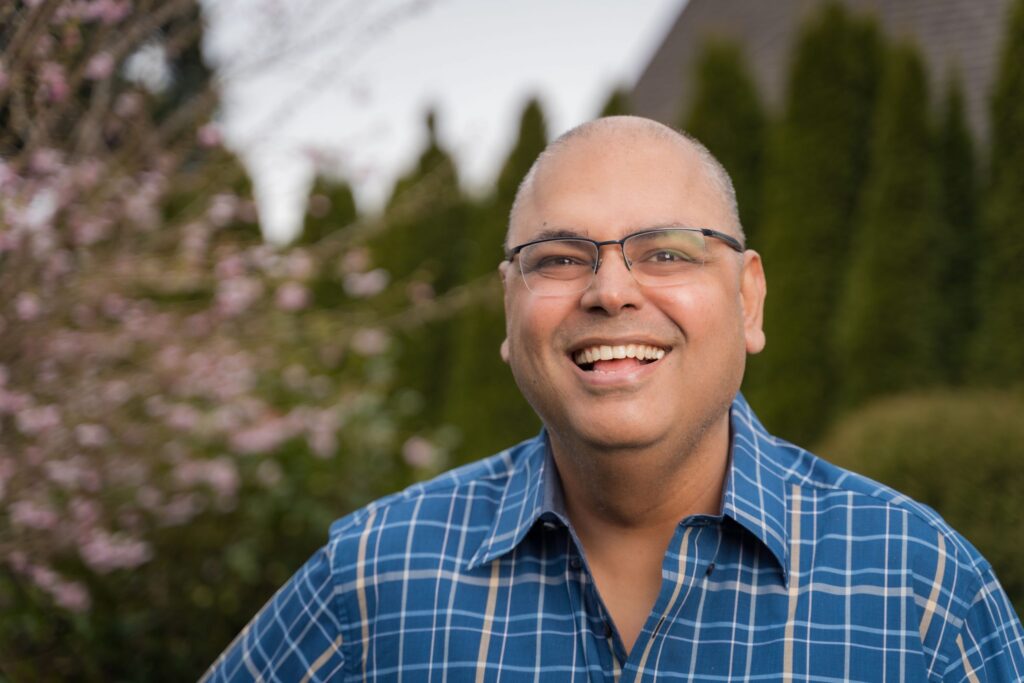By Alex Sangha
Living with manic depression means navigating emotional extremes that can shift from euphoria to despair. As someone who has experienced both sides of this spectrum, I have learned that managing mental illness requires structure, support, and self-awareness. On World Mental Health Day (October 10), I want to share a few strategies that help me when my mood begins to crash — small, practical actions that may help others, too.
When my emotions start to sink and tears come easily, I take proactive steps to pull myself back.
Sleep. I take slightly more sedating medication prescribed by my doctor and rest. Often, sleep acts as a natural reset button. I almost always wake up with a clearer head and a lighter heart.

Swim. I call my friends and head to the new New Westminster First Nations-named Pool. The combination of exercise, water, and friendship helps ground me and reduce stress.
Text and Chat. Connection is crucial. I send messages of gratitude to friends and talk with whoever is available to listen. Reaching out reminds me that support networks matter and that I am not alone.
Music. Hindi love songs often lift my spirit. The melodies carry hope, emotion, and a reminder that beauty still exists even in pain.
Write. I channel my thoughts into writing about the world — its social, political, and economic challenges — and how we can make things better. Turning inward energy outward can transform despair into purpose.
Prayer. I pray to my late friend January Marie Lapuz, my ancestors, and the Creator. A spiritual experience from my youth taught me that faith and connection to something greater can provide comfort.

Cry. When nothing else works, I allow myself to cry — often during a moving film. It releases emotion in a healthy way. Crying, I’ve learned, can be as cleansing as swimming or sleep.
Mental health management is not about finding one perfect cure but building a toolkit of coping strategies that fit your own life. These are mine, refined through trial, reflection, and self-compassion.
Manic depression can feel isolating, but recovery is built through connection — to people, to purpose, and to yourself. The key is to act before despair deepens, to reach out before you retreat, and to recognize that asking for help is a sign of strength, not weakness.

As World Mental Health Day reminds us, mental wellness is everyone’s concern. Whether through empathy, listening, or advocacy, each of us can help reduce stigma and make it easier for others to seek support.
Living with manic depression has taught me that while I cannot always control the highs and lows, I can choose how I respond to them. Hope, in the end, is not the absence of struggle — it is the decision to keep moving forward, one small act of care at a time.
Alex Sangha is an award-winning social worker, counsellor, and documentary film producer. He is the founder of Sher Vancouver and co-founder of the Sundar Prize Film Festival, which will return to Surrey and North Delta for its third edition in April 2026.
















44 Comments
Oliver Haley
4 months agoBuy Adderall Online with Credit Card
Violet D'Amore
4 months agoPurchase Adderall Online
Organic Traffic
4 months agoHello, Neat post. There’s an issue with your website in internet explorer, could check this… IE still is the marketplace leader and a good part of other folks will omit your excellent writing because of this problem.
https://luongsontv2.com/
4 months agoTừ ngày biết đến LuongSonTV, mình không còn phải tìm link rải rác trên mạng nữa. Chỉ cần vào https://luongsontv2.com/ là có đủ trận để xem.
Mary Kuphal
4 months agoBuy Adderall 30mg Online
hepato burn
4 months ago**hepato burn**
hepato burn is a potent, plant-based formula created to promote optimal liver performance and naturally stimulate fat-burning mechanisms.
Kuwin
4 months agokuwin sở hữu kho game đa dạng từ slot đến trò chơi bài đổi thưởng, mang đến cho bạn những giây phút giải trí tuyệt vời.
MM88
4 months agoVới giao diện mượt mà và ưu đãi hấp dẫn, MM88 là lựa chọn lý tưởng cho các tín đồ giải trí trực tuyến.
MM88
4 months agoKhám phá thế giới giải trí trực tuyến đỉnh cao tại MM88, nơi mang đến những trải nghiệm cá cược thể thao và casino sống động.
谷歌站群
4 months ago专业构建与管理谷歌站群网络,助力品牌实现全域流量的强势增长。谷歌站群
Kuwin
4 months agokuwin sở hữu kho game đa dạng từ slot đến trò chơi bài đổi thưởng, mang đến cho bạn những giây phút giải trí tuyệt vời.
站群程序
4 months ago搭载智能站群程序,自动化搭建与管理,为SEO项目提供核心驱动力。站群程序
Kuwin
4 months agokuwin sở hữu kho game đa dạng từ slot đến trò chơi bài đổi thưởng, mang đến cho bạn những giây phút giải trí tuyệt vời.
MM88
4 months agoKhám phá thế giới giải trí trực tuyến đỉnh cao tại MM88, nơi mang đến những trải nghiệm cá cược thể thao và casino sống động.
iwin
4 months agoiwin – nền tảng game bài đổi thưởng uy tín, nơi bạn có thể thử vận may và tận hưởng nhiều tựa game hấp
J88
4 months agoĐến với J88, bạn sẽ được trải nghiệm dịch vụ cá cược chuyên nghiệp cùng hàng ngàn sự kiện khuyến mãi độc quyền.
iwin
3 months agoiwin – nền tảng game bài đổi thưởng uy tín, nơi bạn có thể thử vận may và tận hưởng nhiều tựa game hấp
MM88
3 months agoKhám phá thế giới giải trí trực tuyến đỉnh cao tại MM88, nơi mang đến những trải nghiệm cá cược thể thao và casino sống động.
GO88
3 months agoTham gia cộng đồng game thủ tại Go88 để trải nghiệm các trò chơi bài, poker phổ biến nhất hiện nay.
GO88
3 months agoTham gia cộng đồng game thủ tại Go88 để trải nghiệm các trò chơi bài, poker phổ biến nhất hiện nay.
Cops Badges Badges
3 months agoI appreciate the balanced perspective you provided here.
MM88
3 months agoKhám phá thế giới giải trí trực tuyến đỉnh cao tại MM88, nơi mang đến những trải nghiệm cá cược thể thao và casino sống động.
jili1bet
3 months agoYo, jili1bet is straight fire! Some crazy unique games and the payouts are pretty sweet. Definitely worth checking if you are looking for something a bit different. Hit that up here: jili1bet
iwin
3 months agoiwin – nền tảng game bài đổi thưởng uy tín, nơi bạn có thể thử vận may và tận hưởng nhiều tựa game hấp
Kuwin
3 months agokuwin sở hữu kho game đa dạng từ slot đến trò chơi bài đổi thưởng, mang đến cho bạn những giây phút giải trí tuyệt vời.
wow888app
3 months agoDownloaded the wow888app. Pretty slick interface! Everything is easy to find. Definitely worth a download if you’re into that sort of thing. Get the app here: wow888app
26superph
3 months agoYo, checked out 26superph. Seems legit for a quick spin. Nothing groundbreaking, but solid enough if you’re looking for something new. Just remember to play responsibly, eh? Check it out here: 26superph
trực tiếp gà chọi c1
3 months agoNeed my fix of ‘trực tiếp gà chọi c1’! Hoping for some good live fights. Fingers crossed this link works! trực tiếp gà chọi c1.
ph898
3 months agoYo, check out ph898. Heard some rumblings it’s the real deal. Gonna give it a spin myself and see if it lives up to the hype. Fingers crossed!
Irwin Casino Zahlungsmethoden
2 months agoBei trivago ist der Hotelpreisvergleich zuverlässig, transparent
und einfach. Seine erstklassige zentrale Lage mit Blick auf
die Bucht und den Hafen wird immer wieder hervorgehoben und bietet einen Panoramablick und einen einfachen Fußweg zum
Stadtzentrum und zu den Sehenswürdigkeiten. Das Hotel besticht durch seine atemberaubende Oscar-Niemeyer-Architektur, die von vielen Gästen als einzigartiges und
unvergessliches Merkmal beschrieben wird und eine unverwechselbare Ästhetik der 1960er/70er Jahre bietet, die sowohl grandios als auch gut gepflegt ist.
Aus Gründen der Nachhaltigkeit wird das Wasser des Innenpools nur auf 26 ºC erwärmt.
Dieses klimatisierte Zweibettzimmer verfügt über einen Flachbild-Kabel-TV, ein eigenes Bad und einen Balkon mit Gartenblick.
Das Hotel wurde von Óscar Niemeyer, einem der großen Meister
der Weltarchitektur, entworfen. Die angezeigten Preise hängen vom Wechselkurs ab und können sich zum Kaufzeitpunkt ändern.
Zum Reiten, Tauchen, Angeln und Schnorcheln ist es von der Unterkunft ebenso nicht weit.
Zusätzlich können Familien eine Kinderbetreuung im Hotel beanspruchen. Um das Hotel herum befinden sich allerhand Gastlokale, zum Beispiel das Restaurant Red Lion, das Einkaufcenter Dolce Vita und das Restaurant Chega de Saudade.
Auch wenn Sie in einem klassischen Zimmer untergekommen sind, bringt die Monumentalität der Wohnräume und
des Restaurants Ihre Wahrnehmung ins Gleichgewicht.
Der Architekt Oscar Niemeyer hat das Hotel mit funktionellen Zimmern und beeindruckenden öffentlichen Bereichen kreiert.
Die Koffer werden Ihnen auf das Zimmer gebracht und der freundliche Empfang serviert Ihnen einen Drink.
References:
https://online-spielhallen.de/casino-of-gold-promo-code-ihr-schlussel-zu-exklusiven-vorteilen/
different types of slots
2 months agoRocketPlay Casino’s mobile experience exemplifies modern web
design, utilizing HTML5 technology to deliver
seamless cross-device compatibility without requiring app
downloads. The cashback feature ensures
that even during unlucky streaks, players receive some value back, demonstrating RocketPlay’s commitment to player
retention and satisfaction. RocketPlay Casino’s bonus structure is designed to maximize player value
while maintaining fair and transparent terms. The variety of payment options means players
can choose the method that best suits their preferences, whether they
prefer the anonymity of cryptocurrency or the familiarity of
traditional banking methods. RocketPlay Casino excels in providing flexible
and secure banking solutions that cater to modern players’ diverse needs.
RocketPlay Casino is a very big online casino based on our estimates or collected information. This is a great sign, as any such rules
could potentially be used against players to justify not paying out winnings to them.
RocketPlay Casino has a Very high Safety Index of 9.8, establishing it as one
of the more secure and fair online casinos on the web, based on our criteria.
The casino’s Safety Index, a score indicating the safety and fairness of online casinos, has been determined
through our analysis of these findings. Casino accepts players only over 18 years of age.
Our casino RocketPlay continuously evolves, with regular platform updates, new game additions, and enhanced features.
Our platform utilizes cutting-edge technology to deliver seamless gameplay across all devices.
The foundation of exceptional gaming experiences lies in partnerships with
premier casino software providers who deliver innovative and
entertaining content. On our platform you will find different types of slots and games, which have high RTP and are produced by the most popular providers.
The multilingual support capability ensures players receive assistance in their preferred language, with specialized knowledge of Canadian banking methods and regional gaming preferences.
Mr O no deposit bonus
2 months agoSSL protects all communications between your internet browser and the casino’s
web server. It’s the thrill of real stakes that makes them so popular, and the potential for
some serious winnings just adds to the excitement. E-wallets
such as PayPal and Neteller usually offer the fastest withdrawal times.
Compete in pokies or table tournaments with real cash prizes.
E-wallets like Skrill, Neteller, and PayPal offer fast, secure deposits
with added privacy. Always check the bonus terms
before playing. Many platforms also feature progressive jackpots and game show-style experiences.
References:
https://blackcoin.co/vip-online-casinos-2023-online-casinos-for-vip-players/
https://skilling-india.in/employer/paypal-casinos-best-online-casinos-that-accept-paypal/
2 months agoonline casino that accepts paypal
References:
https://skilling-india.in/employer/paypal-casinos-best-online-casinos-that-accept-paypal/
trbs.link
2 months agoonline roulette paypal
References:
trbs.link
phbetlogin
1 month agoSigned up for phbetlogin the other day. Login process was smooth, no hassles. Exploring the games now, let’s see if my luck holds out!
bet29
1 month agoYo, just checked out bet29. Pretty slick site, easy to navigate. Odds seem decent. Gonna throw a few bucks down and see what happens. Fingers crossed! Good luck to all out there!
138bets
1 month agoHey, just registered at 138bets. So far, so good. They’ve got a welcome bonus that looks pretty tempting, so I’m gonna take advantage of that. Let’s see if I can turn that into some real cash!
tlovertonet
1 month agoI’ve been browsing on-line greater than 3 hours as of late, but I by no means found any attention-grabbing article like yours. It is lovely price sufficient for me. In my view, if all site owners and bloggers made just right content as you probably did, the web will be much more helpful than ever before.
we88heylink
1 month agoSpotted we88heylink, and decided to jump in. Registration was easy-peasy. The games are loading fast, which is a big plus. Let’s see if my luck is in! Worth checking out: we88heylink
st666run
1 month agoJust hopped onto st666run! Gotta say, the mobile experience is on point. No lag, no glitches, just smooth gameplay. If you’re looking for a place to play on the go, this might be it. Give it a shot: st666run
jljl777
1 month agoTried out jljl777 the other day. Seemed okay, nothing really jumped out at me, but also no major complaints. It’s alright, you know? Standard gaming stuff, quick access.
vuaclubapk
1 month agoGrabbed the vuaclubapk and been messing around. The games collection is solid. Had a bit of luck already haha! Seems like a fun app to add to your folder. Check it downloads here: vuaclubapk
hh88bet
1 month agoAlright, HH88bet seems alright. Gave it a run and had a decent experience. Could be worth a punt for some extra excitement. Worth a peek: hh88bet
pg888pg88
1 month agoFancy a spin? I dropped into pg888pg88 and it had a good vibe. Easy to navigate and some fun options. See what you think: pg888pg88